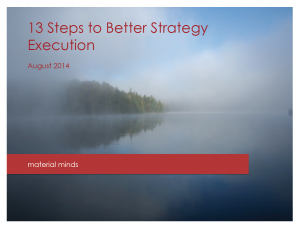by Charles Plant | Oct 5, 2015 | Leadership Development, Uncategorized

We’re doing something wrong in promoting gender equality and I think it starts all the way back to how we name babies. We have a patrilineal naming tradition that asserts to a baby girl that her father is more important than her mother. To me this is the beginning of gender inequality.
As my daughter is now expecting my first grandchild and it is to be a girl, I want her to start life thinking that she is just as important as any boy who is born. To do that I’m advocating a new tradition that a girl’s last name be the same as her mother’s last name.
I’ve written an essay that got published in the Globe and Mail today. It explains a new solution to stop gender inequality at birth.
Pass it on and be a part of a new trend towards true gender equality.
Check out the essay here.
by Charles Plant | Jan 22, 2015 | Uncategorized
I was looking at a performance plan and bonus scheme for someone today and noticed a rather problematic hurdle. That’s one of those statements that says you get a $10,000 or whatever bonus if revenue exceeds $1 million. These weren’t the numbers but I blanched at the amounts as the bonus was large and the hurdle was high. It was so high, it was almost a cliff.

I’ve worked with people before, who when they realize they don’t have any chance of meeting their bonus, sandbag sales in order to shift them into the next year. The same thing happens with ceilings. In the old days IBM had a rule that no one could earn more that the President. That stopped more than one sales rep from selling late in the year.
The problem is, what do you do about performance hurdles and ceilings? I think ceilings are stupid. You can get burned one year without a ceiling but you can change the comp plan the next year so the expected revenue is more in line with reality.
But hurdles are another matter. How do you set a minimum standard without a hurdle. I don’t think there is any way to deal with them except through one of my favourite tools, trailing 12 month averaging. Paying every quarter or even monthly based on the last twelve months results doesn’t penalize or benefit anyone for sandbagging and you can adjust the hurdle rate to make it more realistic on a regular basis.
I know one company that pays bonuses based on weekly results. You can have an off week and it won’t affect the rest of your month. It also means that you can’t slack off for very long as you’re being measured all the time. They have hurdles and they work when measured weekly.
Complex to administer, maybe but it gets rid of quarter and year end stuffing which inevitably leads to operating issues and it keeps people on their toes all the time.
by Charles Plant | Aug 22, 2014 | Uncategorized

13 Steps to better Strategy Execution
I’m teaching a course at U of T in Continuing Studies in the fall called Connecting Strategy with Action. It’s all about driving superlative results through better strategy execution. The most remarkable outcome of students who take it is how they end up shifting their whole management focus from activities to results.
In the course we talk about employees three greatest needs:
- To know exactly what is expected of them.
- To know how they’re doing.
- To understand how they can improve.
I prepared this document as an outline of the course and thought I should share it here as well.
13 Steps to Better Strategy Execution
by Charles Plant | Jul 31, 2014 | Uncategorized
 I’m continually finding interesting entrepreneurship research (among many topics) and thought that it might be useful to share it from time to time. I share on Twitter but it probably just zings by quickly so here is some interesting stuff.
I’m continually finding interesting entrepreneurship research (among many topics) and thought that it might be useful to share it from time to time. I share on Twitter but it probably just zings by quickly so here is some interesting stuff.
Failed Entrepreneurs Find More Success the Second Time.
My favourite entrepreneurship research of the week is about failure. I’m glad to see that failed entrepreneurs are much more likely to be successful on their second go round. This of course means that we’re willing and able to learn from past mistakes.
Culture More Important than Strategy and Execution
While I disagree with these findings of this research it is because it asks opinions of leaders and doesn’t do any empirical research into the subject of causal factors for success. In any case it is an interesting question to ask.
Startup Accelerators
Accelerators and Incubators have become much more prevalent in recent years to assist startups. I was amazed to find that there were 464,819 entrepreneurs applying to 2,856 accelerator programs. I was flabbergasted to think that there were that many of each.
Tech Industry Not Good at Diversity
Finally to something that is disappointing and probably not a surprise. Research by Y Combinator has found that it funds startups with women on the founding team at a lower percentage than those startups’ application rates.
by Charles Plant | Jul 25, 2014 | Uncategorized
 I’m back to talking about science and physics as a way to understand fixing business entropy. (See definition if you missed that blog. This may be boring or confusing but if you read it, I promise it will be good for you.)
I’m back to talking about science and physics as a way to understand fixing business entropy. (See definition if you missed that blog. This may be boring or confusing but if you read it, I promise it will be good for you.)
If you look at entropy in physical or scientific terms it is pretty easy to see how to fix it. Don’t forget that entropy results in a closed system through the equalization of energy among all elements of that system.
So to fix entropy in a physical system you need to add new energy from the outside.
Fixing Business Entropy
Same in business. Fixing business entropy means applying an outside force to find out why chaos is occurring and develop solutions for that chaos.
It can’t be done from the inside due to the nature of entropy. For a person within the business to address chaos, it would mean doing a regular job managing the chaos and adding extra time to deal with the resolution of it.
The extra effort rarely exists and rarely works because all other employees in the business will resist any application of force that would cause them to exert more than the minimal amount of effort required.
That’s where consultants come in. A consultant is an external force that can look objectively at why chaos is occurring, recommend solutions and drive implementation.
Then the consultant can go away and the business is left to slowly devolve into entropy all over again. Entropy is inevitable and that’s why consultants are inevitable. They are the outside force needed for fixing business entropy.
(And I hope that consultants everywhere can use business entropy as a justification for their existence.)
by Charles Plant | Feb 14, 2014 | Uncategorized
 I got a Fitbit Force for Christmas from my mother (thanks Mom) and it has had the unfortunate side effect of making me obsessive about how active I am on a daily basis. As a proponent of metrics, I totally get how they can be used to change behaviour but until now, I didn’t realize just how powerful metrics could be.
I got a Fitbit Force for Christmas from my mother (thanks Mom) and it has had the unfortunate side effect of making me obsessive about how active I am on a daily basis. As a proponent of metrics, I totally get how they can be used to change behaviour but until now, I didn’t realize just how powerful metrics could be.
First, for those of you who aren’t part to the latest tech rage of wearable technology, the Fitbit Force measures how many steps you take in a day, the amount of time you are active, your sleep patterns and a few other things. You wear one of their trackers (in my case like a watch) and it uploads your stats onto the web where you can see your results and track all sorts of other things. You can also link in friends who are wearing one and compete with them as well as earn badges (meh.)
Anyway, I stay fairly active running and cycling but I work out of my house so don’t walk around a lot getting to work or at work unless I am at a client’s for the day. Well much to my horror I discovered that I wasn’t reaching the daily goal of 10,000 steps that Fitbit prescribes. Neither was I racking up enough active minutes of flights of stairs. And to top it all off, my kids were more active than me and beating me hands down for top spot.
Well of course, that had to change. I immediately started walking more, even going out for purposeful walks during the day. I extended my runs and started focusing on how I could meet my step objectives for the day. It has even changed how I get around the city. Before I would get in my car to go see a client. Now where possible I walk to the subway and take public transit. (Those of you who know me know what a radical change this is.)
Last weekend I went to a movie on a Saturday night downtown and even took the subway to that so I could get in more steps. Tonight I will be walking to dinner with my Valentine (Happy Valentine’s Day by the way.)
The point of all this is that measuring my activity with the Fibit has changed my behaviour. My proposition in Leadership Development is that you can’t change behaviour or attitudes just by talking to people (and that’s the way most LD programs work.)
No, if you want to change behaviour, you have to define what success is by having measurable objectives. You have to report back regularly on results. You have to change your process just as I did with the Fitbit.
I didn’t start out trying to change my behaviour but those damn Fitbit Metrics managed to change them just by telling me how I was doing all the time.






